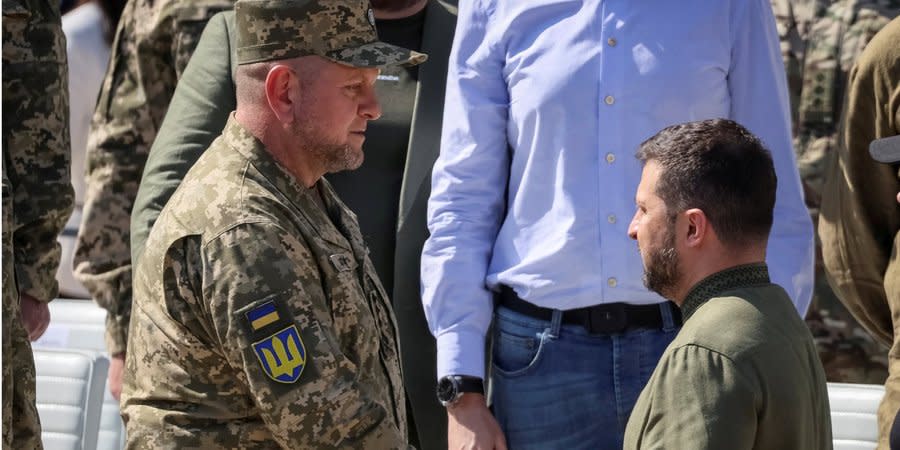Zelenskyy's pivotal decision: swapping top generals in Ukraine's quest for victory

- Oops!Something went wrong.Please try again later.
General Valerii Zaluzhnyi’s resignation as Ukraine's Commander-in-Chief signifies a critical and decisive stage in the conflict, posing risks for President Volodymyr Zelenskyy, wrote The Economist on Feb. 8.
Read also: Budanov and Zaluzhnyi awarded the title of Hero of Ukraine
The article highlights the appointment of Oleksandr Syrskyi as the new Ukrainain army Commander-in-Chief as potentially momentous. Zaluzhnyi's key role in repelling Russian forces during the initial days of the invasion, coupled with his popularity among both military personnel and the civilian population, partly explains the significance of this change.
The differences between Zelenskyy, an actor turned politician, and Zaluzhnyi, a battle-hardened commander, initially pertained to culture and personality. These differences, however, became less imortant after Russia's invasion on Feb. 24, 2022, even turning into an advantage. Journalists noted Ukraine's "network" culture as an inspiring example, with every resistance component focusing on its task rather than centralized control. Zelenskyy played the role of "chief patriot," boldly refusing to surrender to Russian aggression, while Zaluzhnyi, essentially at war with Russia for years, concentrated on combat operations.
Only when both Russian and Ukrainian forces entrenched, and the front lines stalled, did these frictions start to cause harm.
Read also: Political shadows over military leadership: Zaluzhnyi out, Syrskyi in the spotlight
Tensions between them led to disagreements over battlefield strategies. Zelenskyy and his administration blamed Zaluzhnyi for the failure of last year's counteroffensive. They wanted the Ukrainian army to prepare for new attacks, demanding he develop combat plans and undertake the unpopular task of mobilizing additional forces.
Zaluzhnyi dismissed these arguments, citing his caution after the first offensive's failure as a reason to preserve vital troops and equipment. He argued that he could not plan another counteroffensive without knowing available resources and insisted that mobilizing society was a political duty—a stance Zaluzhnyi defended as correct.
It is not unusual in war for politicians and soldiers to hold a low opinion of each other. What really doomed the relationship between Mr Zelensky and General Zaluzhnyi was the president’s shifting view about how the war would determine the sort of country Ukraine should become, the Economist wrote.
Zalenskyy articulately described Ukraine's struggle for its future as a democracy oriented towards Europe and emphasized that Ukraine prioritized human life over land, during his interview with The Economist in Kyiv shortly after the invasion began.
However, Zelenskyy's presidency has increasingly focused on reclaiming all occupied Ukrainian territories, a goal becoming seemingly unattainable for the time, escalating his impatience with his general. Zaluzhnyi's popularity posed a threat, prompting Zelenskyy's desire for more centralized power.
The possible removal of Zaluzhny from his position as Armed Forces Chief first was reported by various Ukrainian media on Jan. 29.
Zelenskyy's spokesperson Serhiy Nykyforov dismissed these reports, and the President did not mention Zaluzhny's resignation in his Jan. 29 evening address.
Read also: With Syrskyi now Commander-in-Chief, who is Zelenskyy considering as new Armed Forces Commander?
Zelenskyy had planned to fire the Armed Forces commander but reconsidered after the information leaked to the media, the New York Times reported.
The potential dismissal stemmed from disagreements over mobilization strategies in Ukraine, The Washington Post reported.
Zaluzhny was offered the position of Secretary of the National Security and Defense Council but declined, The Economist reported.
On Feb. 8, Zelenskyy officially dismissed Zaluzhnyi, appointing Oleksandr Syrskyi, the Commander of Ukraine's Ground Forces, as his replacement. Zaluzhnyi had served as the AFU's Commander-in-Chief for over 2.5 years, appointed by Zelenskyy in July 2021.
A December 2023 survey by the Kyiv International Institute of Sociology showed Zaluzhnyi trusted by 88% of Ukrainians and Zelenskyy by 62%, with 59% expressing trust in both simultaneously.
We’re bringing the voice of Ukraine to the world. Support us with a one-time donation, or become a Patron!
Read the original article on The New Voice of Ukraine

